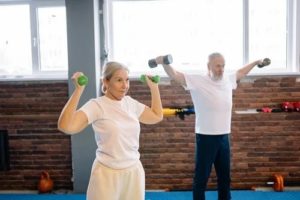Written by Harold Oster, MD. Collagen peptides supplementation may have a beneficial effect on chronic pain in active adults.
 More than 20% of the global population suffers from chronic musculoskeletal pain, a significant contributor to disability in older adults1. Collagen is a major structural protein in bone, joints, and skin. Supplementation with collagen and collagen peptides may have beneficial effects in treating degenerative conditions of these tissues2.
More than 20% of the global population suffers from chronic musculoskeletal pain, a significant contributor to disability in older adults1. Collagen is a major structural protein in bone, joints, and skin. Supplementation with collagen and collagen peptides may have beneficial effects in treating degenerative conditions of these tissues2.
Shiloah A. Kviatkovsky et al. studied the beneficial effects of collagen peptides on chronic musculoskeletal pain in middle-aged men and women who exercised regularly. Eighty-six men and women were recruited to participate in the study. The participants randomly received daily supplementation with ten grams/day of collagen peptides, twenty grams/day, or placebo for six months. They were then given the option to complete an additional three months. At baseline and monthly for the remainder of the study, the participants completed questionnaires on diet and exercise. Symptoms were assessed with the Knee Injury and Osteoarthritis Outcome Score (KOOS) and the Veterans Rand 12 Item Health Survey (VR-12). The KOOS is a 42-point survey evaluating symptoms in five domains: pain, stiffness, ability to perform activities of daily living (ADLs), ability to participate in sports and recreational activities, and quality of life (QoL) with a score of one hundred meaning no symptoms and zero indicating the participant has severe problems3. The VR-12 has two components: the mental and physical component scores (MCS and PCS). MCS evaluates mental and social functioning, while PCS tests for pain and physical function. The mean score in a healthy population is fifty, with higher scores indicating fewer symptoms4.
The authors noted the following:
- Based on defined inclusion criteria, 59 participants completed the six-month arm of the study, and 41 completed the entire nine months.
- At baseline, there were no significant differences in the demographic values of the three supplement groups.
- For the survey measures of the KOOS, there was a trend toward improvement in ADL scores in the group receiving 10g/day of collagen peptides.
- In the KOOS, there was an improvement in pain scores over time from baseline to six months in high-frequency exercisers.
- In the VR-12 survey, there was an improvement in mental component scores in the 10g/day group.
- In the VR-12 survey, physical component scores improved in females in the 20g/day collagen peptides group over the course of nine months.
Results of the study suggest that collagen peptides supplementation may have beneficial effects on chronic pain in adults. Limitations include significant variation in the amount of exercise performed by the participants and a small sample size, possibly resulting in statistical errors.
Source: Kviatkovsky, Shiloah A., Robert C. Hickner, Hannah E. Cabre, Stephanie D. Small, and Michael J. Ormsbee. “Collagen peptides supplementation improves function, pain, and physical and mental outcomes in active adults.” Journal of the International Society of Sports Nutrition 20, no. 1 (2023): 2243252.
© 2023 The Author(s). Published by Informa UK Limited, trading as Taylor & Francis Group.
Click here to read the full text study.
Posted September 19, 2023.
Harold Oster, MD graduated from medical school in Miami, Florida in 1992 and moved to Minnesota in 2004. After more than 25 years of practicing Internal Medicine, he recently retired. Dr. Oster is especially interested in nutrition, weight management, and disease prevention..
References:
- El-Tallawy SN, Nalamasu R, Salem GI, LeQuang JAK, Pergolizzi JV, Christo PJ. Management of Musculoskeletal Pain: An Update with Emphasis on Chronic Musculoskeletal Pain. Pain Ther. Jun 2021;10(1):181-209. doi:10.1007/s40122-021-00235-2
- Khatri M, Naughton RJ, Clifford T, Harper LD, Corr L. The effects of collagen peptide supplementation on body composition, collagen synthesis, and recovery from joint injury and exercise: a systematic review. Amino Acids. Oct 2021;53(10):1493-1506. doi:10.1007/s00726-021-03072-x
- Collins NJ, Misra D, Felson DT, Crossley KM, Roos EM. Measures of knee function: International Knee Documentation Committee (IKDC) Subjective Knee Evaluation Form, Knee Injury and Osteoarthritis Outcome Score (KOOS), Knee Injury and Osteoarthritis Outcome Score Physical Function Short Form (KOOS-PS), Knee Outcome Survey Activities of Daily Living Scale (KOS-ADL), Lysholm Knee Scoring Scale, Oxford Knee Score (OKS), Western Ontario and McMaster Universities Osteoarthritis Index (WOMAC), Activity Rating Scale (ARS), and Tegner Activity Score (TAS). Arthritis Care Res (Hoboken). Nov 2011;63 Suppl 11(0 11):S208-28. doi:10.1002/acr.20632
- Schalet BD, Rothrock NE, Hays RD, et al. Linking Physical and Mental Health Summary Scores from the Veterans RAND 12-Item Health Survey (VR-12) to the PROMIS(®) Global Health Scale. J Gen Intern Med. Oct 2015;30(10):1524-30. doi:10.1007/s11606-015-3453-9
